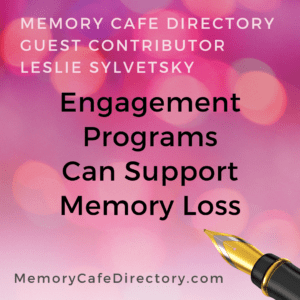Memory Cafe Directory posts and/or links to retailers can be advertising, sponsored, or affiliate links. We may earn a small commission from them. Thank you.
Engagement is Important for Seniors with Memory Loss: Programs Can Help!
We hear that engagement and social interaction is healthy. But why and how do we do it, to what extent, and how do we encourage and support engagement for those with memory loss?
This can feel overwhelming, but sit back, relax, and grab a coffee. Allow for new confidence and empowerment, as you learn about support avenues and options for seniors, caregivers, and activity directors! Support is here, resources exist! Peruse through to find some helpful fits!
Consider the Individual!
It’s taken for granted, the ability to easily call a friend or meet up at a party or lunch. For a senior with disabilities, mental and/or physical, it’s not as easy to make those kinds of things happen.
If you put yourself in that person’s (or are in this) position, it’s likely you’re relying on someone else’s memory and functional abilities to keep track of things, manage life events:
- Where are my clothes?
- Doing laundry, running appliances, cooking/eating, contacting people, keeping tabs on what’s going on in the world, the news, neighborhood happenings.
- The computer?
- Are there reading, hearing difficulties?
- What does it feel like to be stripped of some capabilities or faculties?
Imagine it. Being unable to fully contribute as you may have done in the past can be darn frustrating, even depressing!
From a caregiver’s perspective, responsibilities are huge. Not only are you managing your own requirements but have someone else’s, too. Food providing (prepping/cooking/cleaning/groceries), house cleaning, possibly having to come up with outfits, shower giving, bathroom help. With all this to do, creating a social or interesting environment for your senior may take the backburner as time and energy have limits.
For an activity director of senior programs, the job can feel daunting. Activity creating, encouraging engagement and interactions with fulfilling material requires support.
Whatever your connection is, how do you support your people’s happiness and interest in life in a low stress way? Tall order! Vitally important!
Here’s some ideas for the senior who can use a boost:
- Adult Day Groups
- Memory Cafes and Zoom Groups
- Assisted Living Residence Programs
- Weekly Outings
- Companion Visits
- The “Coffee Class”
Specific details of each of these options follow!
Adult Day Groups
Benefits:
- People feel a sense of purpose, there’s a scheduled plan to interact and socialize with others.
- Sharing experiences!
- An opportunity to learn.
- A lighthearted good-humored atmosphere.
- Food! Beverages/Snacks/Lunch (nutrition!), Dessert – is always a highlight!
- An alternative to TV!
The plusses are huge and worth the effort of finding a good one. Adult Day groups are meant to fill a void for people who may not have much to do and have little social interaction otherwise.
It also allows a nice time segment for a spouse, family member, or care provider to have a breather and get things done without extra concerns. Knowing someone’s loved one is in a safe environment having a good time is appreciated beyond measure.
Not every senior with memory loss fits with this type of program but it caters well to those who enjoy a social environment. If it’s welcoming, it’s easy to be part of. When someone greets you or looks out the window waiting for your car to arrive and runs out to chat and help you in…. that’s appreciated!
Having a nice time with people you like, brings on happiness!
A Successful Group: THE SENIOR SOCIAL
Back in the mid 80’s, an enterprising Patti Murphy, began The Senior Social program. She created this group to give her mom a break as her dad (with Alzheimer’s) needed a social outlet.
Held at the Mercer Island community center near Seattle, WA, the group started small with just two people. The daily design included coffee (current events), morning snacks, activities, games, and lunch.
Over time, the group grew, music performers were added, lots of volunteers and more participants joined. A safe environment evolved where both participant and family members felt a level of comfort.
Most of the participants had some challenges (disabilities, memory loss, etc.) but were not severely impaired and were able to function in a social setting.
Participants
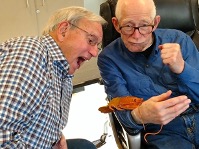
Courtesy Leslie Sylvetsky
The group was comprised of once career-minded, possibly child-raising, community-involved people. Participants were from all kinds of backgrounds. Members included:
- A flirty opera singer
- A fun-loving plastic surgeon
- A boy scout leading cardiologist who started a CAT lab
- An inventor of ‘the inchworm’ a machine that took the husk off grain kernels
- A high school history teacher
- A math teacher who created a rendition of a da Vinci design (ornithopter flying machine) now in the entrance of the Seattle Museum of Flight.
- An antique store owner
- Boeing engineers (one was with the first Peace Corps group – who met JFK before their venture to Colombia)
- A curator of the Museum of History & Industry (MOHAI)
- An English professor
- An appliance salesman
- A VP Engineer (who with Disney, talked France into allowing a Euro Disney and was part of the redesign team for Madison Square Garden)
- Countless other doers and achievers
Volunteers included:
- A few nurses, (one who worked on the Mercy Ship saving many from blindness)
- A microbiologist who worked with the Peace Corps in India in the 60’s
- A retired kindergarten teacher
- A chemist/chiropractor who managed the Seattle Gas Co.!
The list goes on and on. The group was a representation of America – no racial, or otherwise divides. Just a social outlet for those who’d benefit from such a setting.
Kinda Famous!
One particular group member worked on The daVinci flying machine now on display at Seattle’s Museum of Flight.
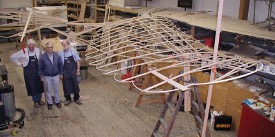 |
 |
| Courtesy Leslie Sylvetsky | |
Notes for Activity Directors/Group Facilitators:
How do you keep the day interesting for people with varying interests as a Senior’s Activity Director?
I came on board, managed and facilitated the Social for about ten years.
There was a lot to the job description: Providing healthy lunches, supply ordering, volunteer management, invoicing, scheduling venues, calendar creating, considering participant needs and interests, leading educational and artistic activities. There was a lot to keep straight!
It was great to have a mixed bag of people who were interested in learning and trying new things which made for a good base to build a day around.
Having an interest in learning and creating helps! The day group provides for a great opportunity to have fun putting projects together and involving others to carry them out.
Activity providers can weave interesting topics into the day!
You can reach the common denominator of adults with subjects that are generally interesting. Current events are captivating, and positive news, especially the unusual is worth focusing on.
Not everyone is a sports enthusiast, but accentuating some highlights, like the way a tournament is structured, such March Madness’ bracketology and/or betting on Kentucky Derby Horses can be interesting to many. Then, announcing the winners the following week or sharing some scores for your town’s teams makes for good material.
Trivia, a daily joke, quote, the weather, birthdays to recognize are great to work in as well.
The Day’s Schedule
After a coffee table chat, we (at Social) moved on to a physical game of some sort. The aim was to have a game set up where it may have tied in with a theme of the day (like lemons, inventors, etc). It was a good time for some physical movement after sitting and coffee.
Day groups often have a full activity closet that houses items like bowling pins, bean bag tosses, all shapes of hoops and rings and odd objects to create a game out of, puzzles, trivia games, craft materials, music sheets, etc.!
If it was butterfly day, maybe the targets are nets to toss into for points. Offer occasional prizes. Someone can keep track of the scores on a white or black board within view. People get competitive and like to see the game stats!
We’d follow with a more mentally stimulating game (such as giant crosswords that a group can have in view), or learn about a subject such as world cheeses (subjects are unlimited!)
Later, lunch and conversation were followed by another physical or mental type of activity, art and/or music. Every day was a different palette of subject matter.
People leaving the group smiling and happy is a good signal that the day was a good one!
2. Memory Cafes and Zoom Groups
Memory Cafes
These groups hold lots of benefits. Covid affected many venues, but the concept is great and they are making a resurgence. Weekly or monthly groups meet locally at designated restaurants, coffee house or other meeting spots for an hour or two. They make for a nice social outing.
To be a true Memory Cafe, a caregiver or family member must join along with the senior affected with memory loss. A facilitator leads the group discussions, often music is incorporated, sometimes there’s an art project, maybe a guest presenter, snack foods and beverages included.
Right here on Memory Cafe Directory, you can find in-person Memory Cafes and virtual Memory Cafes that take place over Zoom or some other teleconferencing platform.
ZOOM Programs
Zoom is a community gathering that doesn’t require transportation!
It’s another social avenue outlet. Often led by a group facilitator who keeps the subject matter moving along. All it takes is a setup from a computer or tablet, and your senior can communicate and participate in activities from the screen. A great way to converse and interact with new folks or old folks from one’s home base!
Examples of Zoom classes for seniors:
- The Gathering Place: an early stage memory loss enrichment program
- Silversurfers: an online community for seniors
- Buzz50: a social networking site for those 50+
This is just a few examples. There are many more on the Internet!
3. Assisted Living Residence Programs
Many, if not all assisted living residences offer activities, such as art projects, games, and music. In high school working in a nursing home, I saw how people used their time. Recreational directors led games (like BINGO), crafts, and cocktail hours. Activities ran through the day.
Not all people enjoy group activities though, and it’s worth considering individual interests.
Engagement, however you imagine it, is simply living! Some seniors get lots of satisfaction from pursuing personal interests or hobbies solo! It’s great to encourage this and provide materials as needed to support those interests! Find out what they are!
One man, a resident who became a friend, had a workshop set up in his small one room unit. He made beautiful, properly weighted, decoy ducks. When I left for college, he gave me one of his ducks! He inspired, which led me to try making one too.
 His |
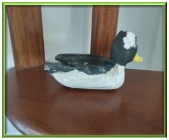 Mine |
| Courtesy Leslie Sylvetsky | |
4. Weekly Outings
If you don’t put plans on the calendar, there may be some missed opportunity as time gets ahead of you. Outings enable a breath of fresh air, a change in scenery, seeing people in action and give some exercise (circulation!) Additionally, the senior feels like they did something worthwhile that makes the day have more vibrancy and meaning.
Weekly Venture Suggestions:
- Visit an old friend!
- Try a new coffee shop!
- Take a drive through town!
- Go to a park!
- Play or set up a game outside (weather permitting)!
- Gardening – good for the soul!
These provide a great change of pace for you both to look forward to on a regulated schedule. Structure is a support mechanism!
5. Companion Visits
Not much beats a visit from a friend, family member, relative, neighbor or someone you had a connection with through work or otherwise. Encourage this! Setting up visits gives a caregiver a little break and enables a different engagement opportunity.
The time frame does not have to be long, even quick visits break up the day. For the senior who is an animal lover, animal visits are great.
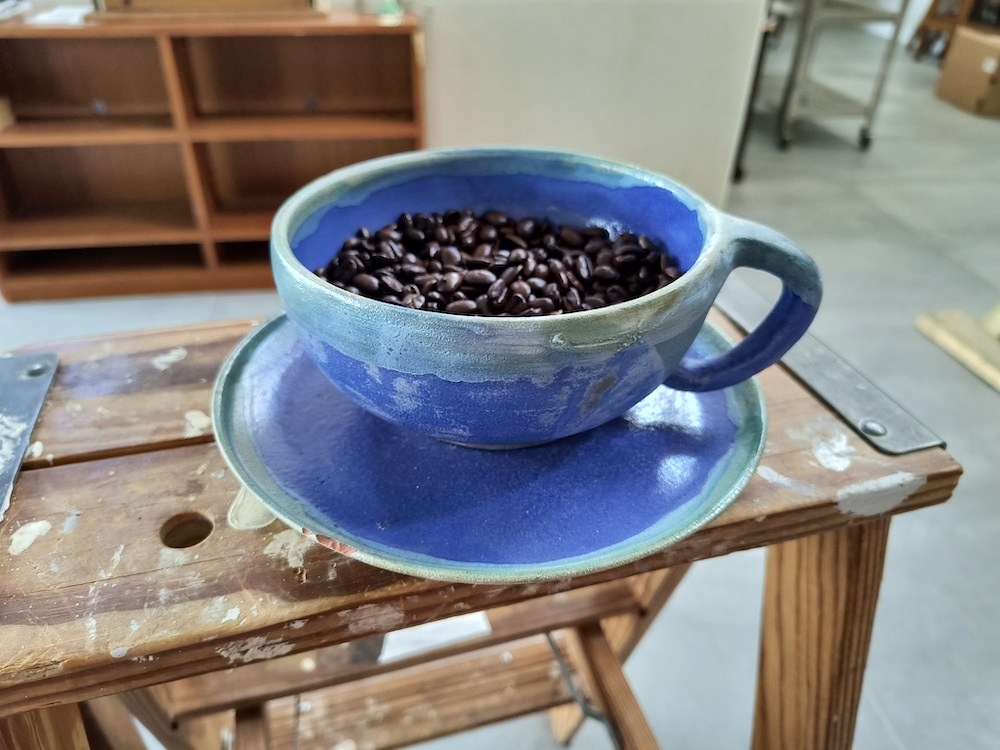
Courtesy Leslie Sylvetsky
6. The “Coffee Class”
For those who don’t get out much and can use some activity, The Weekly Coffee Class program fills a void and makes for 30-60 minutes of learning about a multitude of topics.
After the pandemic hit and venues such as day groups and cafes closed, this program evolved to engage the homebound. It’s been successfully used for memory loss groups and is sent out to seniors around the country.
The program delves into the history of an endless array of subjects. The information within each class is just enough information to be interesting, not tedious and accentuates the fun parts of each topic. Many of the classes incorporate a short 5-10 minute, from-the-chair workout for a break and an exercise opportunity.
The class is created for caregivers, activity directors and seniors. It gives a caregiver a program to do alongside a senior for conversation and memory stimulation. For activity directors, it takes a lot of the work out of planning a day and can use it on a big screen for a group activity session for weekly “on-the-calendar” event. The set-up is designed to be user friendly for the facilitator to encourage conversation in between topics.
Get Grinding!
You’re now equipped with all “the beans!” Time to grind out some fun for you and your people!
About the Author
Leslie Sylvetsky is the creator of the “Senior Coffee Class. It is a weekly program designed specifically for seniors, caregivers, and activity directors to engage in an activity that is both fun and educational.
EarthSoup, LLC is a resource for Seniors, Sr. Activity Providers and Caregivers in need of support to help people maintain independence and ongoing engagement.
Get in touch!
- Email Leslie at earthsoup2@gmail.com
- Visit Senior Coffee Class online
Become a Contributor!
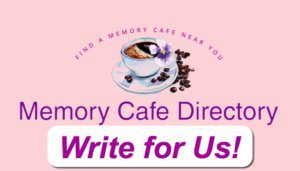 Do you want to be a Memory Cafe Directory contributor? If you have helpful information to share with our community, read about the guidelines, then get in touch to discuss what you have to offer.
Do you want to be a Memory Cafe Directory contributor? If you have helpful information to share with our community, read about the guidelines, then get in touch to discuss what you have to offer.
Thank you.

